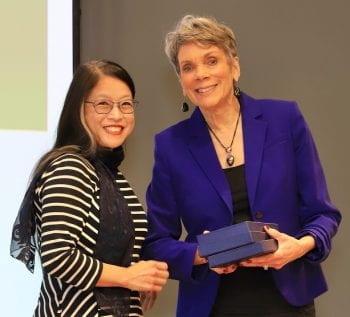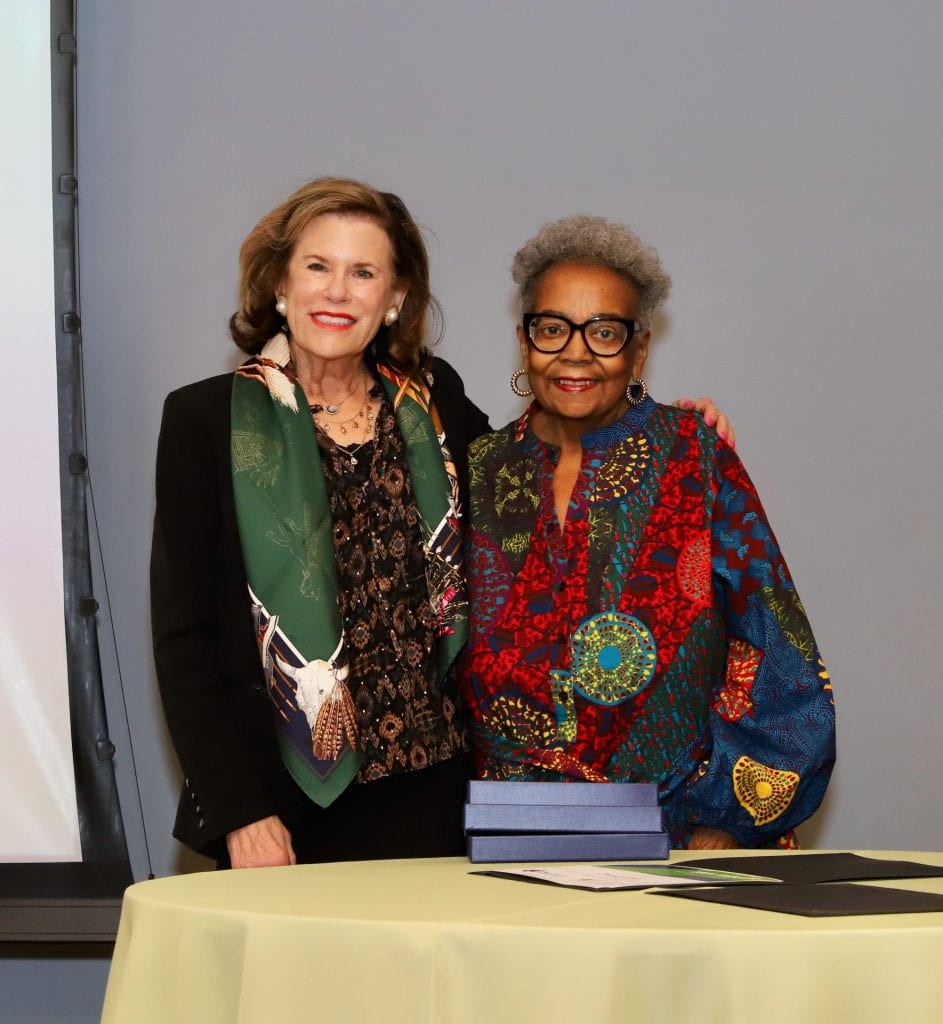Written by Kim Furlow, communications manager, Institute for Public Health
More than 100 WashU faculty, students and community partners in the field of aging recently convened at Knight Hall on WashU’s Danforth campus for the 23rd annual Friedman Lecture and Awards. This year’s event featured awards presentations in three categories for outstanding service in the field of aging and a compelling lecture from Cornell University’s Karl Pillemer, PhD on “Climate Change in an Aging World”.


Friedman Center co-Director, Brian Carpenter kicked off the event with an overview of the issues and projects with which the center is currently engaged. This includes a recently published study by Center co-Director, Nancy Morrow-Howell, PhD, which shows that most higher education Diversity, Equity and Inclusion initiatives don’t give age much attention as a factor in designing their programs.
Morrow-Howell, PhD, the Bettie Bofinger Brown Distinguished Professor of Social Policy at the Brown School, took the stage to introduce the 2024 award-winners. She was joined by Marilyn Sheperd of the Barnes-Jewish Foundation, an event sponsor; and Lynn Friedman Hamilton, whose family is the center’s namesake.


The Alene and Meyer Kopolow Award for Geriatrics, Psychiatry and Neurology recognizes stellar contributions to the care of older adults by a resident, post-residency fellow or junior faculty member in neurology, psychiatry, medicine or related disciplines. This year’s winner is Kaori Sakurai, MD, assistant professor of medicine in WashU’s Division of General Medicine & Geriatrics.
The Harvey A. and Dorismae Hacker Friedman Award for Excellence in Service to Older Adults goes to individuals who have made outstanding service to older adults through practice, education, advocacy or research. The 2024 winner is Madeline Franklin, executive director of STL Village, a nonprofit that helps enhance the quality of life and well-being of people age 50+ who want to continue living at home and stay active in their communities.
The Mark S. Wrighton Research Award on Aging recognizes doctoral candidates who show outstanding promise as researchers on topics relevant to older adults and our aging society. Students to be considered for this award participate in an annual 3MT competition, during which they present their research in three minutes to an audience. 2024 winners:


1st Place: Christi Lero, MSW, LCSW, PhD candidate at the Brown School of Social Work who presented “Using self-compassion to Enhance Wellbeing of Caregivers of People with Neurodegenerative Disease”
Runner-Up: Joseph Lin, MD, WashU School of Medicine PhD candidate who presented on immune targeted therapies for age-related eye diseases such as macular degeneration

The Friedman Center and the audience were pleased to hear from keynote speaker, Karl Pillemer, the Hazel E. Reed Professor of Human Development, Cornell University; Professor of Gerontology in Medicine, Weill Cornell Medicine; and Director, Cornell Institute for Translational Research on Aging. Among other topics, Pillemer addressed the following:
- The earth is the hottest it’s ever been and older people are the most vulnerable to climate effects
- We can ALL prepare and plan for climate related disasters by assessing vulnerability and resilience of older adults during a crisis
- We can see older people as active participants rather than passive victims and include them in environmental justice efforts. “Nothing about us without us!”
The benefits to our communities of helping engage older adults in climate change awareness and action efforts helps improve our local environments; helps change corporate and government policy; and older adults can serve as voices of hope and sources of wisdom to younger people
See more of Pillemer’s talk in this video.


A panel of experts joined Pillemer on stage for a round of questions from moderator, Dan Giammar, PhD, the Walter E. Browne Professor of Environmental Engineering at WashU’s McKelvey School of Engineering and director of the new Center for the Environment. Panelists included:
Mitra Naseh, PhD, a Brown School assistant professor, shared her cutting-edge research at the intersection of aging and climate change and specifically, the impact of climate change on migration/immigration among older adult populations. Naseh alluded to the direct correlation between older adults who are forced to move and the mobility required to do so during war, climate disasters, etc. Also, when international applications for relocation are processed, most humanitarian assistance is limited to those under age 75. “Reaching your destination and receiving protection and asylum should be a universal human right,” Naseh added.
Ben Senturia, a retiree and activist shared his perspective of activism on a number of issues and how older adults can play a large part in activism around climate change. He also pointed out that if we can find out what attracts older adults to environmental organizations and provide a “clearing house” to locate and confirm their participation, we could have many more older adults helping serve the issue of climate change and its impact.
Melanie Tobin, executive director of EnergyCare, a nonprofit that advocates and helps serve St. Louis area older adults impacted by climate change. Tobin discussed how her organization helps older adults suffering from heart disease or breathing issues, who are the hardest hit in severe heat. Those who live in flood plains generally have no resources for an evacuation plan and may not receive early warning.
Other questions centered around solutions to providing basic services to older adults during a climate disaster. Melanie Tobin suggested removing barriers to services (high costs, enabling better warning systems) to make it easier on older adults to get services they need in a climate-related emergency.
The 23rd Annual Friedman Lecture and Awards was made possible by the support of Harvey A. and Dorismae Hacker Friedman Endowment for Aging at The Foundation for Barnes-Jewish Hospital and Washu’s Center for the Environment.
The Harvey A. Friedman Center for Aging works to advance a global society where people of all ages have maximum opportunity for health, security and engagement.